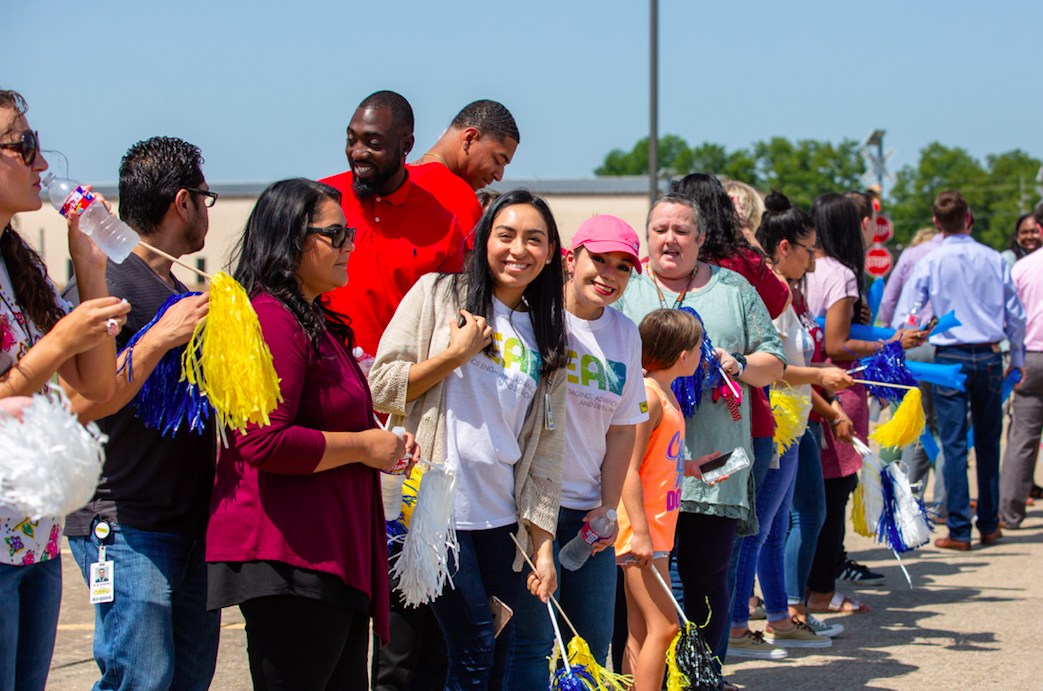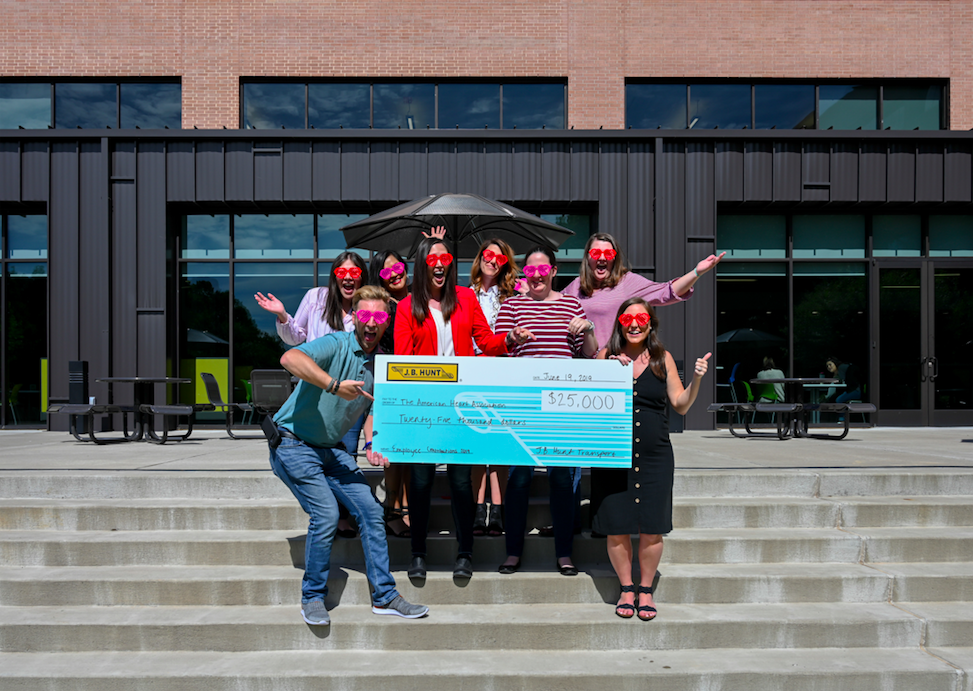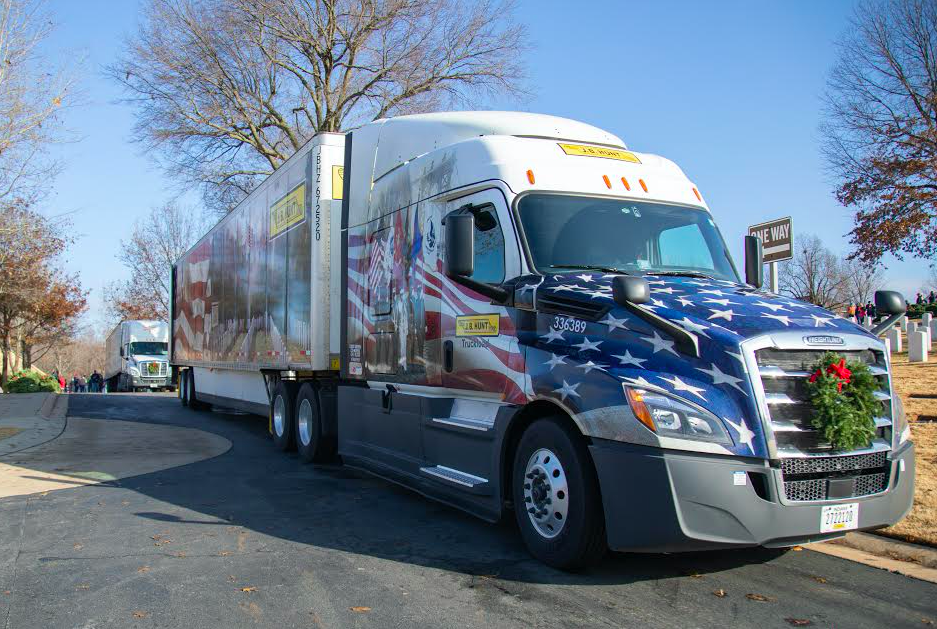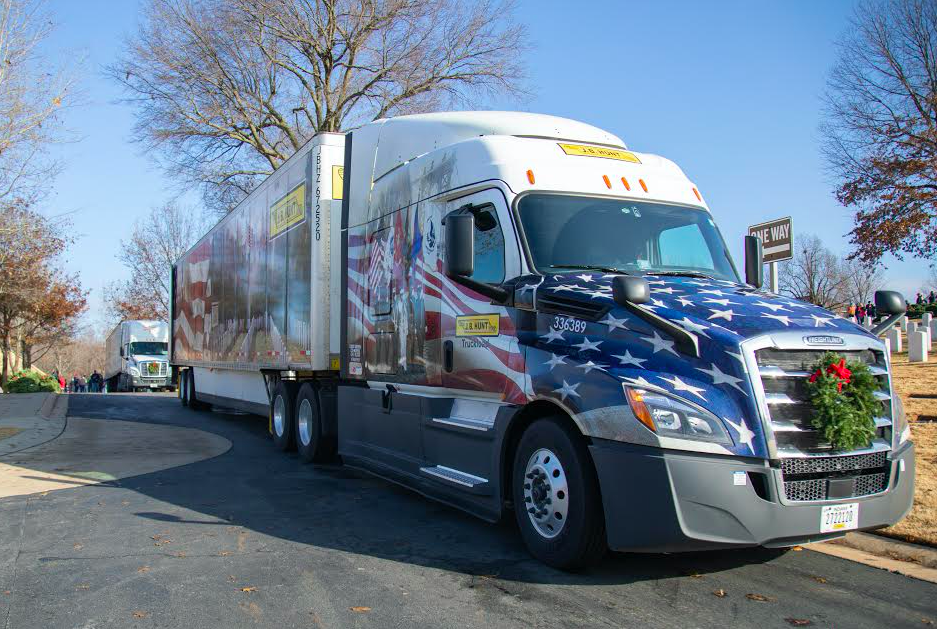This post is part of our Spotlight series, where we spotlight our incredible partners. We are so thrilled that GivePulse has been able to work with these nonprofits, institutions, and corporations!

JB Hunt employees engage with their community through Make-A-Wish
The right reasons
JB Hunt has a long history of giving back to their community. As a Fortune 500 transportation company, their culture of giving thrives in part because of their trucking roots. Amy Bain, Executive Assistant to the Chairman and Manager of Company Giving and Volunteering with JB Hunt, believes this attitude permeates the company all the way to the individual truck drivers. “If something bad happened to you,” she says, “you wanted one of our trucks to stop, because they’d always get out and change a tire. That’s the culture we started with — we did things for the right reasons.”
“We wanted to be like those drivers changing tires. We wanted to get our hands dirty.”
It was that desire to make a direct impact with their community that led the company to reevaluate their model of giving. In the past, “No one ever got to get their hands dirty,” remarked Bain. “I think we wanted to be like those drivers changing tires. We wanted to get our hands dirty.”
JB Hunt also wants to make sure that they are giving for the right reasons: for the good of the community rather than for public approval. She finds that often, “people will say, ‘I didn’t know you did that,’ and that’s because we really want to keep our roots of doing it for the right reasons. And if we do it for the right reasons, people will come to us as their authentic selves.”
Company giving
Part of giving for the right reasons involves working with employees to find the best way to make an impact. That’s why JB Hunt has shifted from the term “corporate giving” in favor of the more employee-oriented “company giving.” “The company may be giving money,” says Bain, “but the employees are giving the impacts and the culture back to us.”

JB Hunt employees donate $25,000 dollars to the American Heart Association
“The company may be giving money, but the employees are giving the impacts and the culture back to us.”
This shift in focus from company to employees has altered the entire culture of JB Hunt. Employees “reinvest in their community,” says Bain, “but when they come in our doors, we’re a community. So whatever they do outside these walls, it affects the people we are inside these walls. We’ve just seen such a change.”
“The biggest change that I’ve seen,” Bain adds, “is how people interact. When you’re in a Salvation Army line, serving food to someone who can’t afford a Thanksgiving dinner with a fellow employee, the next Monday at work when you guys are having a problem… it’s a lot easier to communicate when you know that person is a good person at heart, rather than just being mad over a dropped load.”
“It’s easier to communicate when you know that person is a good person at heart.”
Employee driven
Bain recalls that before shifting their model from corporate to company giving, JB Hunt’s donations were based on what was most important to the executives rather than on what was most important to the majority of individuals working with the company. “We thought writing a check and getting a plaque would matter to people,” she says. Now, however, JB Hunt recognizes that “what matters to people is nailing a nail into a roof alongside a fellow coworker with Habitat for Humanity. It matters that they’re working with the kind of people who want to make the world a better place.”
“It matters [to our employees] that they’re working with the kind of people who want to make the world a better place.”
With this in mind, JB Hunt has developed a giving plan that incorporates employee ideas and values, allowing employees to vote on where the company gives money. Not only has this provided employees a stronger say in the company’s actions, enhancing a culture in which employee contributions to the community are fully valued, but this has also increased the scope of JB Hunt’s giving. “By letting the employees vote and go back to their organizations, we got so many different organizations that we had never heard of, and we were able to give them a donation that was employee-driven,” Bain says.
Individual impact, company culture
Rather than keeping giving separate from the daily working environments of employees, JB Hunt now ensures that giving is an intrinsic aspect of the culture. Bain notes that this allows for a new degree of authenticity. Employees “can come to work and be themselves, and know that there’s a group around them that will also help them overcome their obstacles and life-changing events. It makes such a difference. It helps us be more diverse; it helps us to build community. This year, we spent time educating our employees and treating them more like a nonprofit, to give them empowerment to get on GivePulse and go out [into their community].”
Bain believes that “GivePulse helped us move corporate giving to company giving.” She says, “GivePulse has allowed employees who may not previously have volunteered to “get to an area where they feel safest, dip their toe in and get involved. And once they know, ‘I can do this, I can make a difference with just one hour’ — I just keep going back to the word ‘empowerment.’ I mean, it’s been really empowering. It’s giving. It’s empowering.”
“It’s giving. It’s empowering.”
This empowerment of employees has ramifications beyond their work with nonprofits. “When people feel good about themselves,” Bain says, “they plan for the future, they want to get ahead, they want to be in leadership.”
National giving
JB Hunt further empowers employees by calling upon the diverse skill and knowledge sets that they bring with them, as seen in JB Hunt’s participation in Wreaths Across America. JB Hunt works with many veterans, who “can step up and they can show their knowledge. They teach us how to lay a wreath at a ceremony; they teach us what it means to honor our veterans. I now know what a gold star family is. I know what someone in New York did for Wreaths Across America. It pulls us all together in a community, even if we are across a nation.”

A JB Hunt Truck mobilizes for Wreaths Across America
This sense of community across the country has also changed how JB Hunt responds to natural disasters. Previously, Bain says, if there was a natural disaster, “You were on your own.” Now, however, she says, “We as a company, we can get together, we can help each other, we can get help to those communities. We can use our trailers to haul products donated by our customers. I don’t know any disaster area that doesn’t need a trailerload of fresh water. It’s not just about the nonprofits; it’s also allowed us to mobilize and engage for real life disasters that hit our employees.”
Continuing to evolve
JB Hunt is continuing to increase efforts that will bring the company together across the country to give back. Last year, they tested their first “field event” in Chicago; Bain says, “it worked out so well, so we are going to do from California to Pennsylvania.”
Simultaneous giving spread across the country allows employees to feel united in a common cause. “Employees from five different field offices, thousands of employees, are going to be able to participate in events together. We can do that because of GivePulse. I can’t wait. We really want to spread it. We want to throw money where our mouth is.”
Growth like this relies upon a robust volunteer management platform: “We are able to do it because we can coordinate it and get everybody on the same page through GivePulse.”
Company giving benefits everyone
Bain also notes that GivePulse’s ability to build capacity for company giving is evident in WalmartGivesNWA. “Walmart came up with the NWA giving where they match — and we’re even able to tap in to that.” JB Hunt has been able to engage their employees through WalmartGivesNWA to increase their impact on the community. “It’s crazy that GivePulse can bring us even more attached to our communities. Different people, maybe they don’t work at JB Hunt, but we can still be attached to the good they’re doing in the community. Who would’ve thought that another company could benefit from a company’s giving? It just intertwines us so much.”
“GivePulse can bring us even more attached to our communities… It just intertwines us so much.”
At the end of the day, this feeling of connection stands out to Bain: “It pulls us all together in a community, even if we are across a nation. I just feel so much more connected. I’m respectful of more people. I’ve been able to learn by working with them and volunteering with them, their stories. Sometimes the grumpiest person is just trying to survive. They have a sick child, or an elderly father they can’t find care for.”
“I talk about this all day long — I don’t feel like I can talk about it really professionally, because I get so worked up about it personally, because it means so much…I know all the bad, but there’s so much good too.”
“There’s so much good.”
To discuss how GivePulse can help your CSR program make an impact in your community, schedule a call with our team.

